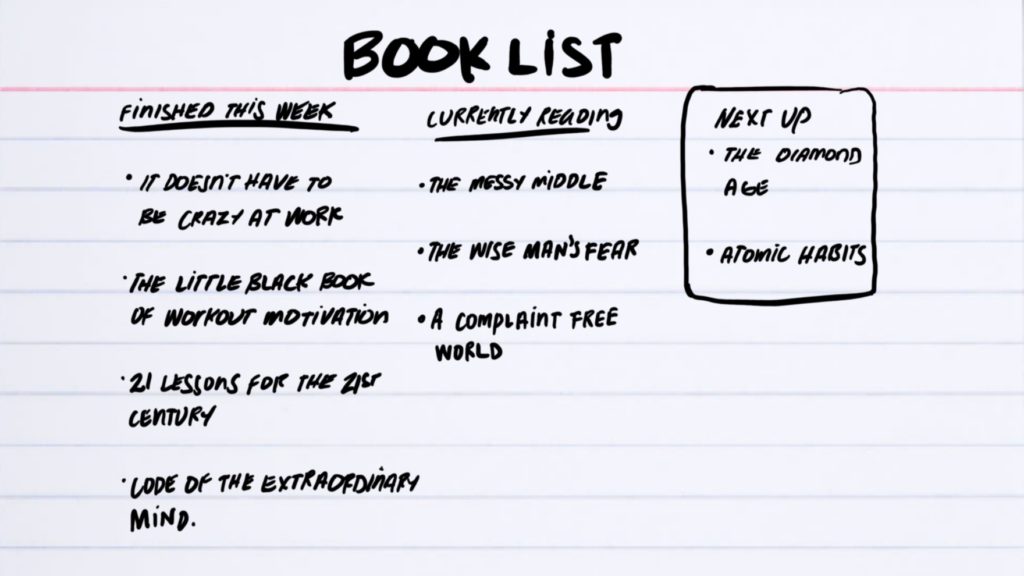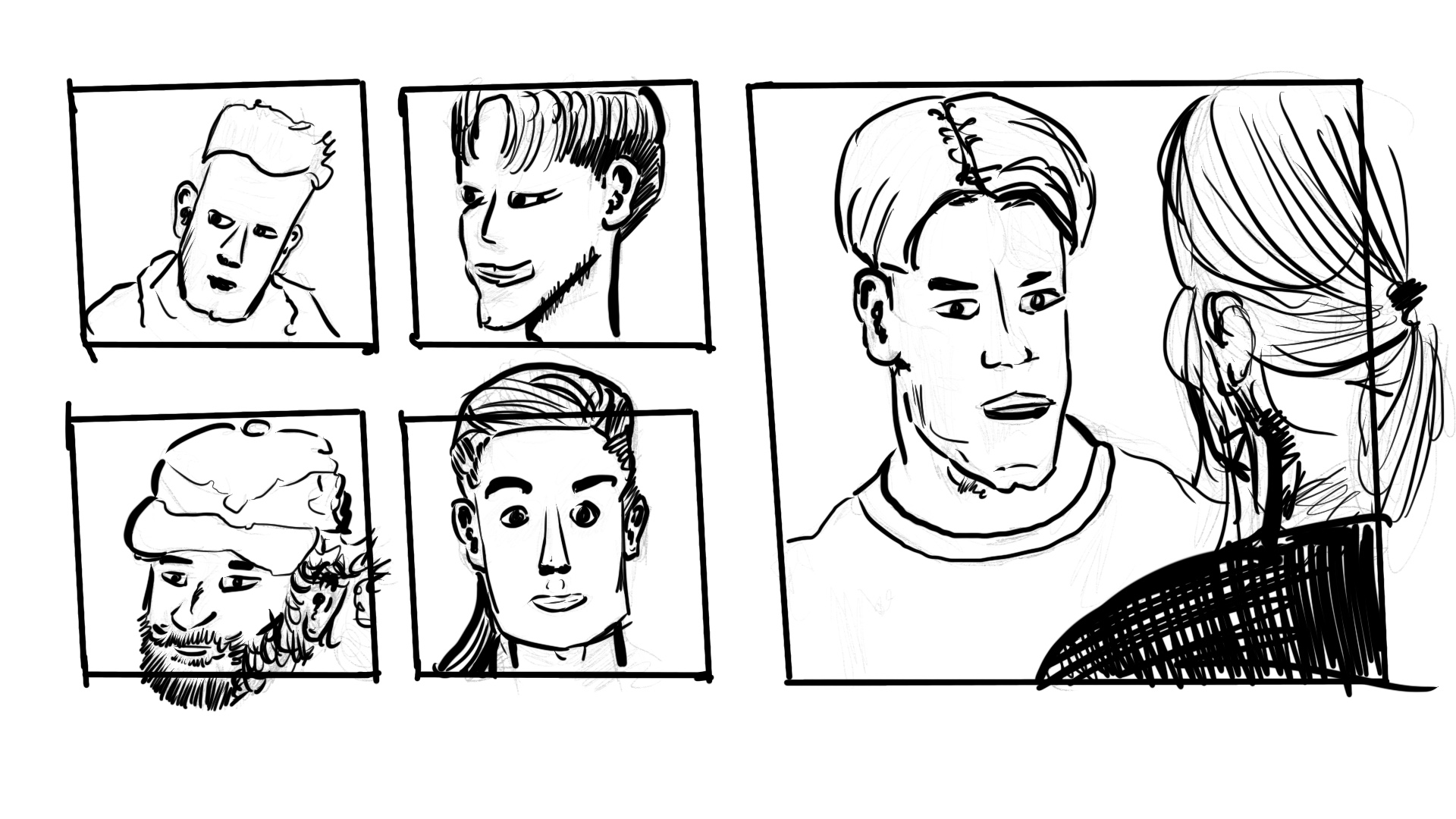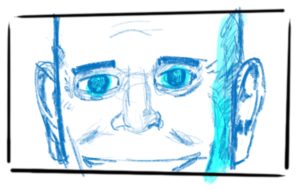While starting this draft I’m currently waiting for the Khabib/Conor fight. (Writing this with the undercard in the background.)
What kind of value could I create if I had a weekly newsletter? I’ve tried it in the past. What could I share that’s unique?
- I read a lot of books: This isn’t particularly unique but it’s a start. There are quite a few people who read more than me who are also happy to write and share what they’re reading. Still, it’s worth putting a circle down for the venn diagram.
- I listen to a lot of podcasts: This is more and more common but I really just listen to a ton and always have. That’s why I think doing the book + podcast pairings would be good. Using podcast interviews in place of my own interviews probably gets me 80% of the value. Because it’s often just a few sentences that don’t appear in a book anywhere that make calling someone up and talking to them so good. (The other 20% would be that you get some street cred for having access to them. Which also could be the 80% if that’s more important—it very well could be.)
- I use an iPad (just about) every day: Of my top 5 most viewed (which isn’t saying much!) videos on YouTube, 3 are about making presentations with an iPad. I’d be happy to make more of them, too. I’m typing this on an iPad right now. I really like the thing. I use the Pencil pretty much daily.
- I write (just about) every day: I’m not publishing things every day but I do have a habit of writing small things here and there. I have outlines of future posts that I’ll never get around to finishing. I have full drafts that I’ll never get around to publishing. And that’s fine. I’d like to finish more though. But I do write regularly. Maybe now’s the time to treat it with a little more respect.
- I live in New York: It’s… a pretty popular place for writers to live. So it’s not really unique but still it’s worth putting down. As long as I do things that make it uniquely New York. Or start putting some more of that day to day life into the posts.
So there we go. I always want to get away from writing about writing and blogging about blogging. Then I just keep blogging about blogging, like right now. Anyway. I’ll try to write this newsletter with each of those 5 elements. First up. A venn diagram of those 5 intersections.
Oh yeah… I just remembered that it needs to be that weird shape so that all the combinations of intersections show up.
Anyway, I think only the center really matters for trying to make this stand out. (brb i think i need to read Purple Cow)
So I’ll just fill this newsletter with a little bit of each.
- Books: I’ll share what I’m reading
- Podcasts: I’ll share some of my favorites from the week
- iPad: I’ll share more bad venn diagram drawings
- Writing: Maybe that’s sort of implicit since this is a written newsletter
- New York: I took a very long walk today so I’ll share that (Update: Moving that to a separate post.)
I’m 600 words in… Let’s get started!
Books: Still skimming too many
I’d love to have a book tracking section on the site. Mostly because I need a better system for picking books. That said, I need to apply some of the ideas from @sirupsen’s “How I Read”:
Inevitably, it grew into a large number of unread books on my Kindle, which made me often dread opening it. It felt like an ever-growing to-do list (where each item takes many hours to complete).
Until I have anything more elaborate, I’ll just share books I finished, books in-progress, and books I plan on reading. And also books I’m sort of reading (things I know I won’t read cover to cover or books I’m re-reading parts of).
Books I finished this week (didn’t necessarily start this week):
- It Doesn’t Have to Be Crazy at Work by Jason Fried and DHH: I don’t do this often, but I read this in a day. And not like listening to an audiobook at 3.5X. Or the “How to read a book in a day (aka just skim it!)” type of reading. I set a few hours in the morning and at night to finish it. Enjoyed every bit of it. If you like Jason Fried and DHH’s writing you’ll enjoy this book also. There’s no fluff. They’ll change your mind about something about the best ways to work. Calmness is worth practicing. (And check my post out for more about this book!)
- The Little Black Book of Workout Motivation by Michael Matthews: Good book about motivation. It’s not as specific to workouts as you might guess from the title. I see that as a good thing. (You very well might see it as a bad thing.) He makes it stick with some science, interesting historical examples, and personal stories from starting out wanting to write a book to now having employees and running a big fitness business.
- 21 Lessons for the 21st Century by Yuval Noah Harari: This is a collection of essays around some of the themes in Harari’s Sapiens (what happened) and Homo Deus (what’s can possibly happen) with a focus on what we can possibly do now to prevent some of those bad possible futures. Loved the heavy technology essays. I’m a sucker for any new discussion about whether we’re in a simulation or not. And he made politics and globalization issues approachable. (Not quite my strengths in subject matter knowledge.)
- The Code of the Extraordinary Mind by Vishen Lakhiani: Biggest takeaway here is the idea of “brules”—I’ve seen them similarly called limiting beliefs or invisible scripts. If you work out regularly, you’ve probably made changes to your exercise approach to reach your goals. That kind of mindset can be applied to so much more than fitness. You’re allowed to be happy even if you haven’t reached your goal yet. You’re allowed to change careers. In many cases, you don’t need permission in the first place.
Books in progress:
- The Messy Middle by Scott Belsky: Just started this. Like just started the intro. I want to start having a more focused rotation (probably something like one fiction, one business/self-development-y nonfiction, one biography/narrative nonfiction) of books I’m reading from start to finish. This will be my business/self-development-y book for the next few weeks. I’ll write some posts about it.
- The Wise Man’s Fear by Patrick Rothfuss: Picked this back up. I’ve been listening to it on long walks and am starting to really enjoy going through books this way. I have a hard time listening to fiction books during my commute. I think it’s because I’m focused on not getting run over. I’m about 3/4 through it now and probably liked the first book more but we’ll see how this ends. (There’s something great about first books in fantasy series and just learning what’s possible and seeing where the edges are.)
- A Complaint Free World by Will Bowen: I complain too much. That’s something I realized this year. I want to complain less. Quick advice up front: get a wristband to give yourself a physical thing to do (move it to your other wrist) when you catch yourself complaining.
Next up (I think):
- The Diamond Age by Neal Stephenson: Something Yuval Noah Harari mentions in 21 Lessons for the 21st Century is that science fiction is important. So much of our technology was first imagined in science fiction from decades ago. It motivated me to read more science fiction. Some of my favorite books ever (Enders Game, The Forever War) are science fiction. I don’t read enough science fiction considering how much I enjoy it. I read Stephenson’s Snow Crash a few years ago and read In the Beginning…Was the Command Line a few months ago. I want to read as many of Stephenson’s novels as possible. I think I’m gonna go with The Diamond Age, then Anathem, then Seveneves, then Cryptonomicon. As always we’ll see. But for now, I’m excited to start The Diamond Age.
- Atomic Habits by James Clear: This comes out next week and I’m really looking forward to it. James Clear’s blog was one of the main inspirations for how I’ve approached my blog. He appeared on The School of Greatness and listening to that episode got me excited for the book. From a couple early impressions I’ve read, it’s a very practical book about habits.
Podcasts: Matt Damon, James Clear, and Ryan Holiday
Matt Damon (Bill Simmons Podcast)
They talk a lot about Good Will Hunting (and how the first draft was a college assignment), growing up in the industry with Ben Affleck (and hated the narrative that Ben took bad roles while Matt picked smart roles), Rounders (with a great John Malkovich impression), and a lot more. It’s almost two hours and great the entire way through.
Pairs well with… Principles by Ray Dalio
Matt Damon tells a bunch of stories about looking for jobs in the 90s. He was competing for the same roles that were going to Brendan Fraser, Ed Norton, and oh yeah his roommate, Ben Affleck.
Anyway, he describes a “come to Jesus” moments with him and Ben where they looked at the landscape and realized their strategy couldn’t be to wait around to get lucky. This led to them focusing on writing Good Will Hunting and insisting that they were the lead actors in it. Principles is about stepping back and understanding the bigger picture.
It’s interesting to hear Damon talk about his own career as a whole while going through a few individual movies and their outcomes. He knew that The Martian was high risk/high reward because a big percentage of the movie is just him, alone on screen.
The Rainmaker seemed like a surefire hit (it wasn’t) because adaptations of John Grisham books were killing. And he didn’t expect Good Will Hunting to become what it became. (Their goal was to make something they’d be proud to have on their VHS shelf.)
Any of those single outcomes doesn’t define the bigger picture.
Ray Dalio describes this with a poker analogy in Principles:
For example, if you’re a poker player and you play a lot of poker, you will win some hands and lose others and on any given night you might walk away with less money than a lesser player who’s gotten lucky. It would be a mistake to judge the quality of a player based on just one outcome. Instead, look at how well someone does what they do and the outcomes they produce over time.
Damon talks about taking roles and how you sign up knowing the ingredients going in but that doesn’t guarantee that the end result will match what you’re visualizing. He’s had a good arc so check out that episode to hear more about it.
James Clear (School of Greatness)
Speaking of ingredients, there are a few different things that have motivated me to increase the amount that I walk. One of them is James Clear’s appearance on Lewis Howes’s School of Greatness. Clear’s book Atomic Habits is coming out soon and Lewis asks him what his five non-negotiable habits are. He starts with three:
- Exercise: He strength trains 4 days a week and finds a lot of mental benefits from it along with the physical benefits.
- Reading: He describes reading as the ultimate meta skill to improvement. So many things can be solved by reading. Most problems aren’t new so there’s something out there that will help you solve it.
- Writing: He says writing is thinking. If you hear something and reply to it right away then it’s an emotional reaction. If you write about it you’ll take more time to consider the idea and weigh it against ÷your existing frameworks.
Those three are his foundational habits. (The other 2 of 5 he picks are walking and sleeping.)
Oh yeah, so that was some inspiration for my walking routine because it combines those three core habits. Albeit in less effective ways but I’m hoping that the duration and consistency makes up for it. When I walk I’m able to (1) exercise — walking is healthy, (2) read — by listening to audiobooks, and (3) write — I’ll add notes to the audiobook and also stop for a few minutes to sit down and write a little bit.
Ryan Holiday (James Altucher Show)
I just hated all of that so I said, “Why don’t I just start a company where I only work on things that I like?”
This episode is a live recording from James Altucher’s 5-year celebration of Choose Yourself. They discuss one of Ryan Holiday’s recent purchases (an entire ghost town), why you absolutely shouldn’t start a podcast (and why you absolutely should), what went into publishing Choose Yourself (and some other titles like Pick Yourself), and what one of Michael Jordan’s weaknesses is (which used to be one of his greatest strengths).
Pairs well with… It Doesn’t Have to Be Crazy at Work by Jason Fried and David Heinemeier Hansson.
Theres’s a lot of similarities in Ryan Holiday, Jason Fried, and DHH’s approaches to work. One important part of that is taking the time to identify what you enjoy about your work and trying to maximize the time you can spend doing that.
Part of that comes from keeping your company small. From It Doesn’t Have to Be Crazy at Work:
We decided that if the good old days were so good, we’d do our best to simply settle there. Maintain a sustainable, manageable size. We’d still grow, but slowly and in control. We’d stay in the good days—no need to call them old anymore.
I really like how Ryan Holiday frames it. A frequent twist is that your goal somehow becomes the opposite of your initial motivation:
The other interesting thing about so much of entrepreneurship is, like, people start their own company ‘cause they want to be their own boss. And then the exit strategy is you sell to another company which you then have to go work at for an extended period of time. So the success is that you end up doing the one thing that you specifically did not want to do.
Know yourself: learn what you enjoy doing and then shape your environment to be able to do it often. (Even if it means moving—Ryan hates New York and moved to Austin.)
What’s coming down the line
I finished this a full week after starting it. That’s too long and unsustainable for a newsletter. That said, what’s here is mostly what I wrote that night (update: Conor lost, bad) then I sat on this as a draft for the week because there was an entire section about the long walks I’ve been taking. I’ll make that a separate post and might focus the newsletter to just reading updates (finished, in-progress, upcoming) and favorite podcast episodes from the week.
I’ll leave with this collage from my walks.



